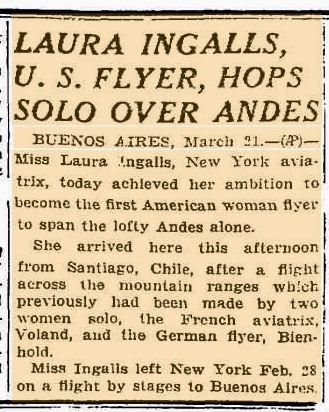On this day
in 1934, a female aviator set one of her many records, this one as the first
American woman to fly solo over the Andes. Who was she?
Before I
reveal the answer, note other records this aviatrix set:
- First flight around South America
- Longest solo flight made by a woman (17,000 miles)
- First solo flight from North America to South America by a woman
- 741 consecutive barrel rolls and 930 consecutive loops
- First female to fly nonstop New York to Los Angeles, and fastest flight LA to NY.
Do you know
who she was?
Hint: It wasn’t Amelia Earhart.
It was Laura
Ingalls.
Not that
Laura Ingalls. Not Laura Ingalls Wilder, who wrote the Little
House books, and about whom I usually write. This Laura Ingalls is
completely unrelated.
This Laura
Ingalls was born around the turn of the
century (she always gave her date of birth as 1901, but records indicate it was
likely some years before that). She learned to fly in 1928, and was setting
records within two years. When questioned about her life choices, she
remarked that she had the good fortune to be raised by a mother who instilled
in her “the ability to hurdle
difficulties and achieve the reputedly impossible.”
She was friends with Amelia Earhart, breaking some of the latter’s
records, and Howard Hughes. So why has almost no one heard of her?
Probably because in 1942 she was charged with being an “unregistered
German Agent,” that is, a spy for Germany. This charge stemmed from her
involvement with America First, a pacifist organization that existed before the
Second World War. The group disbanded within days of the attack on Pearl Harbor,
and it is questionable how many members actually recognized the organization as
pro-Nazi, but anyone who had been a member was suspect. Ingalls was especially
on the government’s radar since she had flown over the Capital in 1939 and
dropped a load of anti-war pamphlets.
Although she denied the charge or any affiliation with Nazism, Ingalls
was found guilty, and that was the end of her aviation-record-setting career.
She spent twenty months in a prison in West Virginia, and not much was heard of
her after that, until her death in California in 1966.



